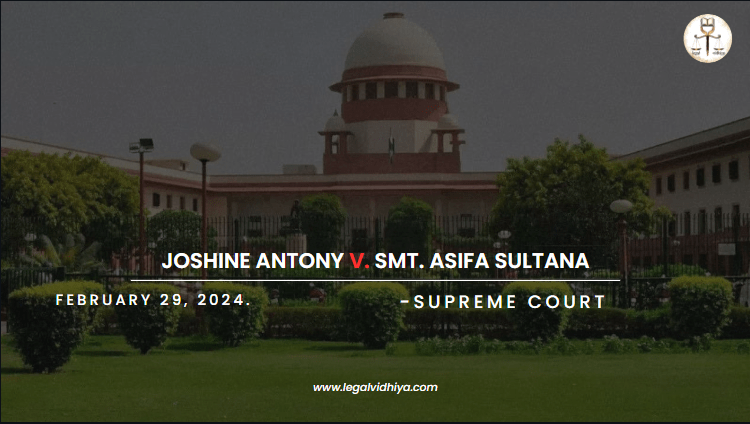
| CITATION | Criminal appeal No(S). 1046 of 2024 |
| DATE OF JUDGMENT | February 20, 2024 |
| COURT | Supreme Court of India |
| APPELLANT(S) | Joshine Antony |
| RESPONDENT(S) | Smt. Asifa Sultana & Ors. |
| BENCH | Hon’ble Justice Mr. Abhay S. Oka and Hon’ble Justice Mr. Ujjal Bhuyan |
INTRODUCTION
In this case the appellant filed a complaint against the respondents in relation to the unlawful storage of a substantial amount of cow meat in a godown, citing her title as an Honorary Animal Welfare Officer. The Karnataka Prevention of Cow Slaughter and Cattle Preservation Act, 1964 (the “1964 Act”) was eventually incorporated into the FIR, which was initially filed under sections 420 and 429 of the Indian Penal Code. The FIR was dismissed by the High Court, which was acting in accordance with Section 482 of the CrPC. The primary concern was the legitimacy of the procedure used to obtain the samples, which was carried out by an Assistant Director of the Veterinary Department.
FACTS OF THE CASE
- The appellant lodged a complaint with the Assistant Director of the Veterinary Department, the fifth respondent, alleging that cow flesh was illegally stored.
- Originally filed under sections 420 and 429 of the IPC, the FIR was later amended to include sections 4 and 5 of the 1964 Act.
- The appellant contended that there was strong evidence, backed up by records and DNA testing, that the meat was cow flesh. The FIR was overturned by the High Court prior to the investigation going further.
- By using its authority under Section 482 of the CrPC, the High Court invalidated the FIR on the grounds that the sample collecting procedure was unlawful.
- Without permission, the Assistant Director entered the facility, took samples of meat, and sent them off for examination.
- The Supreme Court pointed out that the Assistant Director’s authority under the 1964 Act was restricted to inspection and did not include the ability to take meat samples.
ISSUES RAISED
- Did the 1964 Act’s provisions permit the Assistant Director to collect meat samples?
- Was it incorrect for the High Court to dismiss the FIR on the grounds that the sample collection was lawful?
CONTENTIONS OF APPEALENT
- Based on preliminary evidence and the findings of a DNA test, the appellant maintained that the meat discovered in the respondents’ possession was cow flesh.
- The appellant used the results of the DNA test and the overwhelming prima facie evidence of cow flesh to support their case for the legality of the FIR.
- It was argued that Section 10 of the 1964 Act gave the Assistant Director the right to gather samples.
- The appellant contended that the High Court intervened in the investigation too soon.
CONTENTIONS OF RESPONDENT
- The respondent contended that the Assistant Director’s powers were restricted to inspection under the 1964 Act, and that he therefore exceeded his authority in gathering meat samples.
- The respondent also argued that the prosecution’s case was predicated on the illegality of the sample collection.
JUDGMENT
The Supreme Court affirmed the High Court’s ruling to suppress the FIR, highlighting the Assistant Director’s unlawful sample collection procedure. It brought to light the Assistant Director’s inability to get samples in accordance with the 1964 Act, meaning that the prosecution’s whole case was predicated on unlawful sample collection. Applications that were still pending were handled appropriately
ANALYSIS
The main point of contention was whether the Assistant Director’s collecting of meat samples was authorized. The 1964 Act’s Section 10 gave restricted permission to access and examine properties, but it forbade the taking of samples. The High Court’s decision to quash the FIR was predicated on the illegality of the sample acquisition, which tainted the entire case. The prosecution’s case depended on the illegally taken sample for analysis. It also clarifies the fundamental idea that activities committed without the required authorization may compromise the legitimacy of legal proceedings. Also in this case the court didn’t use any reference or specific precedent.
CONCLUSION
The prosecution’s case was undermined by the Assistant Director’s unlawful collection of the meat sample, which was done in violation of the 1964 Act. Therefore, the fact that the Supreme Court dismissed the appeal serves as more evidence of the importance of following legal procedure when gathering evidence, which in turn causes the criminal cases against the accused to be thrown out. This case serves as a timely reminder of how essential maintaining procedural integrity is to maintaining justice. As a result, the High Court had good reason to dismiss the FIR.
REFERENCES
https://indiankanoon.org/doc/120457982/
This article is written by Ankita Maurya student at Graphic Era Hill University, Dehradun; intern at Legal Vidhiya.
Disclaimer: The materials provided herein are intended solely for informational purposes. Accessing or using the site or the materials does not establish an attorney-client relationship. The information presented on this site is not to be construed as legal or professional advice, and it should not be relied upon for such purposes or used as a substitute for advice from a licensed attorney in your state. Additionally, the viewpoint presented by the author is of a personal nature.




0 Comments